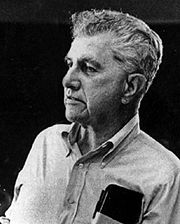- Merton Miller
-
Merton Miller Chicago School of Economics 
Born 16 May 1923
Boston, MassachusettsDied 3 June 2000 (aged 77)
Chicago, Illinois, USANationality United States Institution Carnegie Mellon University
University of ChicagoField Economics Alma mater Johns Hopkins University (Ph.D.)
Harvard University (M.A.)Influences Fritz Machlup Influenced Eugene Fama
Michael Jensen
Richard Roll
Myron ScholesContributions Modigliani-Miller theorem Awards Nobel Memorial Prize in Economic Sciences (1990) Merton Howard Miller (May 16, 1923 – June 3, 2000) was the co-author of the Modigliani-Miller theorem which proposed the irrelevance of debt-equity structure. He shared the Nobel Memorial Prize in Economic Sciences in 1990, along with Harry Markowitz and William Sharpe. Miller spent most of his academic career at the University of Chicago Booth School of Business.
Contents
Biography
Early years
Miller was born Jewish, in Boston, Massachusetts to Joel and Sylvia Miller, an attorney and housewife.[1] He worked during World War II as an economist in the division of tax research of the Treasury Department, and received a Ph.D. in economics from Johns Hopkins University, 1952. His first academic appointment after receiving his doctorate was Visiting Assistant Lecturer at the London School of Economics.
Career
In 1958, at Carnegie Institute of Technology (now Carnegie Mellon University), he collaborated with his colleague Franco Modigliani there to write a paper on “The Cost of Capital, Corporate Finance and the Theory of Investment.” This paper urged a fundamental objection to the traditional view of corporate finance, according to which a corporation can reduce its cost of capital by finding the right debt-to-equity ratio. According to the Modigliani-Miller theorem, on the other hand, there is no right ratio, so corporate managers should seek to minimize tax liability and maximize corporate net wealth, letting the debt ratio chips fall where they will.
The way in which they arrived at this conclusion made use of the "no arbitrage" argument, i.e. the premise that any state of affairs that will allow traders of any market instrument to create a riskless money machine will almost immediately disappear. They set the pattern for many arguments based on that premise in subsequent years.
Miller wrote or co-authored eight books. He became a fellow of the Econometric Society in 1975 and was president of the American Finance Association in 1976. He was on the faculty of the University of Chicago Graduate School of Business from 1961 until his retirement in 1993, although he continued teaching at the school for several more years.
His works formed the basis of the "Modigliani-Miller Financial Theory".
He served as a public director on the Chicago Board of Trade 1983-85 and the Chicago Mercantile Exchange from 1990 until his death in Chicago on June 3, 2000.
Personal life
Miller was married to Eleanor Miller, who died in 1969. He was survived by his second wife, Katherine Miller, and by three children from his first marriage and two grandsons.[2] Three children by his first marriage: Pamela (1952), Margot (1955), and Louise (1958).
Bibliography
- Merton H. Miller (1991). Merton Miller on Derivatives. New York: John Wiley & Sons. ISBN 0471183407.
- Merton H. Miller (1991). Financial Innovations and Market Volatility. Cambridge, MA: Blackwell Publishing. ISBN 1557862524.
- Merton, Miller H.; Charles W. Upton (1986). Macroeconomics: A Neoclassical Introduction. Chicago: University of Chicago Press. ISBN 0226526232.
- Kessel, Reuben A.; R. H. Coase, Merton H. Miller (1980). Essays in Applied Price Theory. Chicago: University of Chicago Press. ISBN 0226432009.
- Fama, Eugene F.; Merton H. Miller (1972). The Theory of Finance. New York: Holt, Rinehart & Winston. ISBN 0030867320.
See also
- List of economists
- List of Jewish Nobel laureates
- Modigliani-Miller theorem
- Eugene Fama
References
- ^ "Merton H. Miller". The Notable Names Database. 2008. http://www.nndb.com/people/174/000159694/. Retrieved 2008-09-18.
- ^ Louis Uchitelle (2000). "Merton H. Miller, 77, Dies; Economist Who Won Nobel," New York Times, June 5.[1]
External links
Nobel Memorial Laureates in Economics (1976–2000) Milton Friedman (1976) · Bertil Ohlin / James Meade (1977) · Herbert Simon (1978) · Theodore Schultz / Arthur Lewis (1979) · Lawrence Klein (1980) · James Tobin (1981) · George Stigler (1982) · Gérard Debreu (1983) · Richard Stone (1984) · Franco Modigliani (1985) · James M. Buchanan (1986) · Robert Solow (1987) · Maurice Allais (1988) · Trygve Haavelmo (1989) · Harry Markowitz / Merton Miller / William Forsyth Sharpe (1990) · Ronald Coase (1991) · Gary Becker (1992) · Robert Fogel / Douglass North (1993) · John Harsanyi / John Forbes Nash, Jr. / Reinhard Selten (1994) · Robert Lucas, Jr. (1995) · James Mirrlees / William Vickrey (1996) · Robert C. Merton / Myron Scholes (1997) · Amartya Sen (1998) · Robert Mundell (1999) · James Heckman / Daniel McFadden (2000)
Complete list · (1969–1975) · (1976–2000) · (2001–2025) Chicago school of economics Founders Monetarism Milton Friedman · Anna J. Schwartz · Karl Brunner · Phillip D. Cagan · Harry G. Johnson · Allan H. Meltzer · David E.W. LaidlerNew economic history New social economics Jacob Mincer · Gary Becker · James Heckman · Thomas Sowell · Sherwin Rosen · Kevin M. Murphy · John A. List · Steven Levitt · Roland FryerPublic choice school James M. Buchanan · Gordon Tullock · Randall Holcombe · Anthony Downs · William A. Niskanen · Bryan CaplanLaw and economics Business and finance Harry Markowitz · Myron Scholes · Merton Miller · Julian Lincoln Simon · Eugene Fama · Kenneth FrenchCareer awards Research awards Categories:- Financial economists
- American economists
- American business theorists
- Jewish American scientists
- Nobel laureates in Economics
- American Nobel laureates
- Harvard University alumni
- Johns Hopkins University alumni
- University of Chicago faculty
- Carnegie Mellon University faculty
- Corporate finance theorists
- 1923 births
- 2000 deaths
Wikimedia Foundation. 2010.
